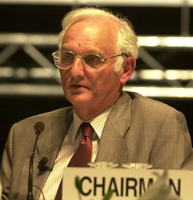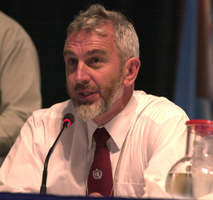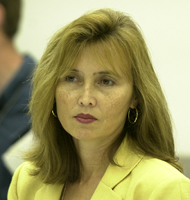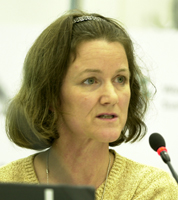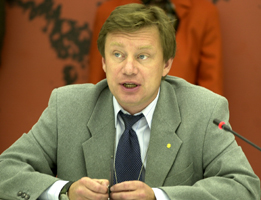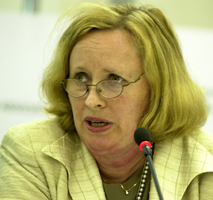|
|
|||||||||||||||||||||||||||||||||||
|
|||||||||||||||||||||||||||||||||||
|
Events convened on Tuesday, 17 July 2001 |
|
Special
Presentation on the IPCC Third Assessment Report - Climate Change
2001 This event provided an overview of the contributions of IPCC Working Groups I and II to the IPCC Third Assessment Report (TAR).
The Scientific
Basis: Sir John Houghton, Co-Chair of IPCC Working Group I,
outlined Working Group I's findings in the recent IPCC TAR. He
noted that the concentrations of CO2 and methane have risen greatly
since pre-industrial times. He emphasized that changing land use
could influence atmospheric CO2 concentrations. He noted that
one of most significant unknowns is influence of aerosols in cloud
formation. Recalling that the objective of the UNFCCC is to stabilize
greenhouse gas (GHG) concentrations without jeopardizing sustainable
development, he emphasized that stabilizing emissions does not
stabilize atmospheric concentrations; emissions must be reduced
far below today's levels in order to stabilize concentrations.
John
Mitchell, Hadley Centre, addressed climate model evaluation,
detection and attribution of climate change. He explained that
climate modeling, as well as the realism of climate models have
improved, due to higher grid resolution, more physically-based
parameterization, and more complete coupling, though models
are still not perfect. He emphasized that the warming over the
last 100 years is very unlikely to be due to internal variability
alone, and reconstructions of climate data for the last 1,000
years also indicate that this warming was unusual and unlikely
to be entirely natural in origin. Mitchell highlighted differences
in recent surface and free atmospheric trends, the size of internal
variability, natural forcing, anthropogenic forcing, especially
aerosols, and the estimate of response (sensitivity) as primary
uncertainties. Robert
Watson, IPCC Chair, described the carbon cycle and the role
of carbon sinks in mitigating global climate change. He stated
that the next 100 years will see an upswing in the role of the
terrestrial biosphere as a sink, and highlighted the associated
importance of afforestation, reforestation and deforestation
activities. Emphasizing the importance of avoided deforestation
in stabilizing global CO2 levels, he noted mitigation potentials
in developing countries. He concluded that stabilizing global
climate change, in addition to land use, land use change and
forestry activities, requires a global reduction in fossil fuel
emissions. Ulrich
Cubasch, IPCC Working Group I, presented climate projections,
including regional projections and sea level rise. He described
different climate scenarios and impact models used for detecting
weather forecasting and events such as flooding for predicting
economic and social consequences. He concluded that further
research into uncertainties regarding extreme climate phenomena
is needed. Impacts,
Adaptation and Vulnerability: Neil Leary, IPCC Working Group
II Technical Support Unit, presented an overview of Working
Group II's findings regarding the impacts of climate change,
adaptation and vulnerability. He underscored that temperature
changes have already affected many physical and biological systems.
He noted that catastrophic weather-related losses increased
tenfold since the 1950s. Some natural systems are at particular
risk, such as coral reefs, mangroves, and endangered species,
and many human systems are inherently sensitive, such as water
resources, agriculture, human settlements, energy, and financial
services. He emphasized that some changes will be beneficial,
while some will be harmful. He recalled that Working Group II
had identified risks to unique and threatened systems, risks
of extreme climate events, the distribution of impacts, and
aggregate impacts as major areas of concern.
Barry Smit, University of Guelph, defined adaptation as a means
to reduce vulnerability to climate change. He emphasized that:
climate change is not just about global warming but also about
changes in the frequency of extreme climate events; adaptation
must be tackled in the short term to avoid incurring long-term
costs; and Convention commitments to adaptation have been made.
He concluded by noting that: adaptive capacity varies depending
on the coping strategies of different countries and socioeconomic
groups; development activities tend to omit climate change risks;
vulnerability issues need to be addressed; and adaptation and
adaptive capacity require further research.
Paul Desanker, Global Environmental Change Program - Africa, spoke about climate change concerns for Africa. He highlighted a significant improvement in data on the impacts of extreme events such as floods, droughts, major storms and disease epidemics. He outlined key impacts of climate change in Africa, including: vulnerability to sea-level rise in Cairo; adverse impacts to fisheries in Morocco and southwest Africa; species loss and impacts on livelihoods in the Sahel; droughts and economic impacts in southern Africa; major impacts on agriculture in eastern Africa; and recurrent droughts in the Horn of Africa. Desanker emphasized that LDCs have differentiated needs given the very low economic ability to implement adaptation activities. He underscored that overall vulnerability is high due to heavy reliance on rain-fed agriculture, frequent droughts and floods, and poverty. Osvaldo Canziani, Co-Chair of IPCC Working Group II, emphasized the interconnections between the economic, social and environmental elements of sustainable development. He stressed that climate change is not an isolated issue but is intrinsically linked to other environmental problems, which must be considered in an integrated fashion at the policy level. He recalled the need for work on sustainable development criteria that are particularly relevant to climate change. More
information: Contact:
|
|
Developing and auditing a global GHG inventory for Texaco Presented by the World Business Council for Sustainable Development (WBCSD) and the International Emissions Trading Association (IETA)
This event explored the experiences and outcome of the recent audit, conducted by the URS Corporation and KPMG, of Texaco's greenhouse gas (GHG) protocol and global emissions inventory. Sarah Patel, Texaco, explained that Texaco's GHG management activities include seeking new market opportunities in the next generation of clean, efficient technologies, assessing emissions, promoting flexible market mechanisms, and investing in research and development of carbon sequestration. In 1997, Texaco began developing its GHG protocol, which was used to develop the emissions inventory. Lisa Campbell, URS Corporation, noted that the review of Texaco's GHG protocol revealed that it is generally consistent with accepted calculation methodologies, is complete with respect to the constituents included, and includes all key material sources, although greater detail is needed on boundaries, equity share and management practices. Melanie Eddis, KPMG, outlined the findings of the audit phase. She highlighted improvements in the quality of data from 1997 to 1999, although significant quantified deviations from GHG data totals did occur. She said KPMG and URS had recommended that Texaco embed improved systems and controls to collect and report data throughout the corporation; expand ownership of GHG data reporting to allow a more bottom-up approach; update the protocol to remove ambiguities; provide guidance on data and documentation retention; and correct and update emissions factors.
Campbell then highlighted lessons learned from the verification experience. She stressed the need to include all sources, including contracted emissions, and to take boundaries issues into consideration, particularly indirect emissions from imports and exports of electricity and steam. Regarding equity share, she advocated using a gross working share, rather than a net working share basis in order to ensure transparency and the accounting of all emissions. Campbell highlighted the importance of having effective data management systems and controls, providing clear guidance in protocols to ensure consistency across reporting units, and, in the absence of international rules, maintaining flexibility in inventory reporting. Discussion: Participants enquired whether Texaco takes into account the effects of its marketing and lobbying on emissions, and urged Texaco to include company-wide product utilization emissions in its inventory. More
information:
|
|
Russian-European cooperation on energy and climate Presented by the Royal Institute of International Affairs (RIIA) in collaboration with the Russian Ministry of Fuel and Energy This event, which addressed the crucial importance of the Russian Federation in the climate change process and ratification of the Kyoto Protocol, was introduced by Michael Grubb, Imperial College of Science and Medicine. Christiaan
Vrolijk, RIIA, described a recent workshop on "Energy and
Climate: Russian-European Partnership," and illustrated
existing cooperative efforts between the EU and the Russian
Federation in support of the Kyoto Protocol. He highlighted
the significance of the Russian Federation in the compliance
of Europe and other Parties through joint implementation (JI)
and emissions trading with recycling.
Alexey
Kokorin, WWF Russia, noted that the Russian Federation supports
ratification of the Kyoto Protocol, providing strict criteria
on compliance in emissions reduction targets, CDM and rules
for emissions trading. He said that a lack of good domestic
legislation on economic regulation in the Russian Federation
hinders implementation of good practice. Maurits
Blanson Henkemans, Dutch Ministry of Economic Affairs, presented
the Netherlands' lessons from Russian-Dutch JI cooperation.
He described the experience of the Dutch ERUPT programme and
concluded that, despite the complexities of JI projects, the
Netherlands maintains a strong interest in developing JI with
the Russian Federation. On JI and emissions trading and the role of the Russian Federation, Kristian Tangen, Fridtjof Nansen Institute of Norway, described some advantages of project-based mechanisms over emissions trading in the Russian Federation. He highlighted a current lack of institutional capacity and suggested that project success requires a clear institutional mandate. The ensuing discussion noted the need for: a proper institutional framework for EU-Russian Federation cooperation; compliance on emissions trading; potential for a Greenfund with transparent monitoring and verification; and the importance of revenues from emissions trading in effectively developing the Russian Federation's energy sector. More
information: Contact: |
|
The Chicago Climate Exchange: Creating a market for GHG emissions trading Presented by the Joyce Foundation
Alice LeBlanc, Environmental Financial Products LLC, provided an overview of the Chicago Climate Exchange (CCX). The CCX is a voluntary pilot GHG trading programme, funded by the Joyce Foundation, which targets emissions sources and offset projects in North America, with limited offset projects in Brazil. The primary objectives of the CCX are to demonstrate that a capped emissions trading approach supplemented by offsets can be effectively applied to achieve GHG emissions reductions, and to identify a representative price of reductions. The CCX design includes: a voluntary cap and allowances for emitters; project-based offsets that include sinks, renewables, methane destruction and CDM projects in Brazil; all GHGs; a registry; and standardized rules for monitoring, verification, reporting and trade documents. The proposed reduction timetable is to reduce emissions to two percent below 1999 levels by 2002, with the target falling an additional one percent per year below 1999 from 2003-2005. The initial region of focus is a seven-state area in the midwestern US. The CCX is being launched in 2001, and plans to expand to commitments and trading by participants throughout the US, Canada and Mexico in 2003, and internationally in 2004. Thirty-three companies and organizations have signed up for the design phase, including thirteen Fortune 500 companies. More
information:
|
|
|
|
| The Earth Negotiations Bulletin (ENB) on the side is a special publication of the International Institute for Sustainable Development (IISD) in cooperation with the United Nations Framework Convention on Climate Change (UNFCCC) Secretariat. The Editor of ENB on the side is Kira Schmidt <kira@iisd.org>. This issue has been written by Emily Boyd <emily@iisd.org> and Kira Schmidt <kira@iisd.org>. The Digital Editors are Andrei Henry <andrei@iisd.org> and Kenneth Tong <ken@iisd.org>. Photos by Leila Mead <leila@iisd.org>. Funding for publication of ENB on the side at COP-6 Part II is provided by the UNFCCC Secretariat. The opinions expressed in ENB on the side are those of the authors and do not necessarily reflect the views of IISD and funders. Excerpts from ENB on the side may be used in non-commercial publications only and only with appropriate academic citation. For permission to use this material in commercial publications, contact the Managing Editor at <kimo@iisd.org>. Electronic versions of these issues of ENB on the side from COP-6 Part II can be found on the Linkages WWW server at http://enb.iisd.org/climate/cop6bis/enbots/. | |
|
|
| © 2001, IISD. All rights reserved. |
|




